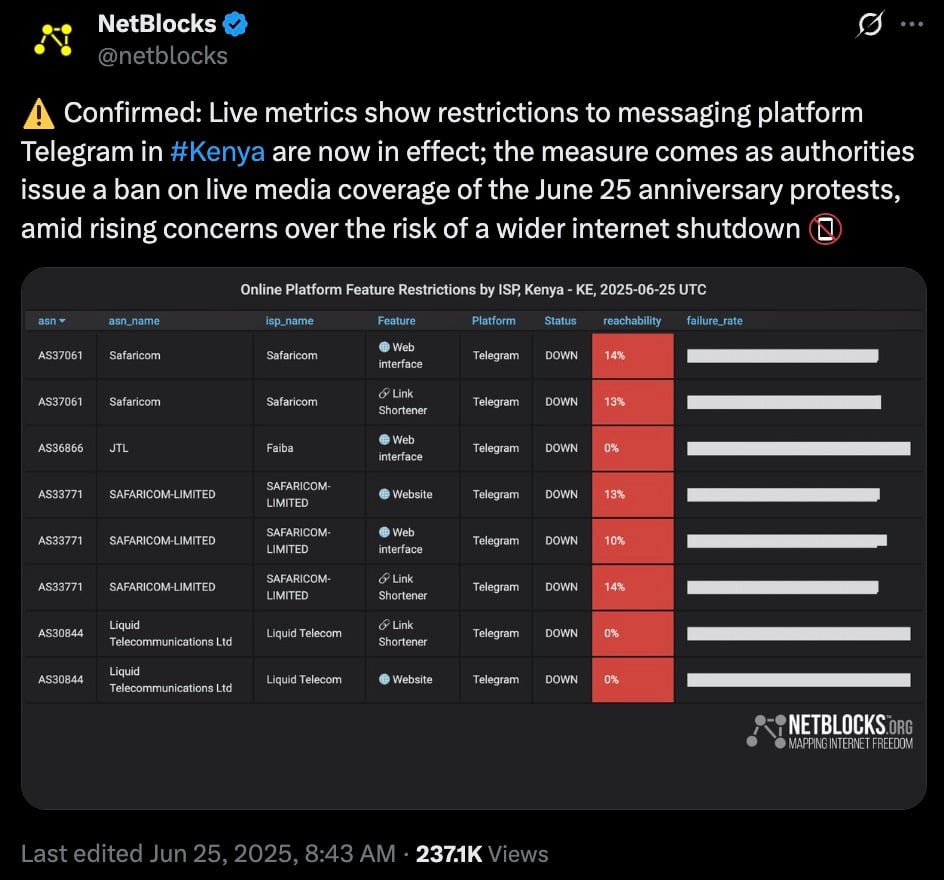If you’re tired of censorship and dystopian threats against civil liberties, subscribe to Reclaim The Net.
Amid mounting unrest over economic conditions and state governance, Kenyan authorities on Wednesday intensified their suppression of dissent by blocking access to Telegram and silencing prominent television broadcasters.
The clampdown coincided with the anniversary of last year’s fatal demonstrations opposing the Finance Bill and a nationwide prohibition on broadcasting protest footage live.
Almost immediately, the move sparked widespread alarm among civil society groups, legal experts, and press organizations, who denounced the measures as a grave infringement on constitutionally guaranteed freedoms of speech and access to information.
NetBlocks, a global digital rights monitor, reported a dramatic drop in Telegram accessibility across Kenya, confirming a near-total outage by mid-afternoon.
“Live network data show a major disruption to internet connectivity in #Kenya; the incident comes amidst a deadly crackdown by police on #RejectFinanceBill2024 protesters a day after authorities claimed there would be no internet shutdown,” the organization posted.

Telegram, widely used for organizing demonstrations and disseminating real-time updates, saw its reach shrink to virtually zero, effectively isolating millions of users.
Shortly after, the digital silencing was compounded by a broadcast blackout. Major outlets including KTN News, NTV, and Citizen TV were pulled off the air following a contentious order from the Communications Authority of Kenya (CA).
The directive, issued on June 25, accused stations of violating Kenya’s Constitution and the Kenya Information and Communications Act by airing protest coverage that could allegedly compromise public order.
KTN News acknowledged the move, stating, “KTN taken off-air following Communications Authority directive to halt live coverage of protests; but coverage continues on KTN News YouTube, Facebook, and Twitter platforms.”
Standard Group, which owns KTN, responded forcefully: “We will sue any signal carrier who switches our channels off air without explanation that can withstand the scrutiny of law, justice, and fairness.” The company described the directive as both “illegal and unconstitutional.”
Nation Media Group, the operator of NTV, echoed those concerns, declaring, “The shutdown of NTV is a direct interference with our editorial operations and a suppression of the media’s constitutionally protected role.”
They cited Article 34(2) of the Constitution, reinforcing that media content must remain free from government interference.
With traditional outlets forced off the air, many turned to digital alternatives. Livestreams and posts on platforms like TikTok, X, Facebook, and Instagram continued to relay events to the public, highlighting the resilience of grassroots journalism in the face of institutional shutdowns.
If you’re tired of censorship and dystopian threats against civil liberties, subscribe to Reclaim The Net.
The post Kenyan Government Blocks Telegram, Shuts Down TV Broadcasters Amid Anti-Finance Bill Protests appeared first on Reclaim The Net.
Click this link for the original source of this article.
Author: Cindy Harper
This content is courtesy of, and owned and copyrighted by, https://reclaimthenet.org and its author. This content is made available by use of the public RSS feed offered by the host site and is used for educational purposes only. If you are the author or represent the host site and would like this content removed now and in the future, please contact USSANews.com using the email address in the Contact page found in the website menu.





